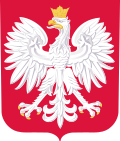 |
|---|
| Part of the Politics series |
| Direct democracy |
|---|
 |
| |
There have been several referendums in the history of Poland.
 |
|---|
| Part of the Politics series |
| Direct democracy |
|---|
 |
| |
There have been several referendums in the history of Poland.
There were no country-wide referendums, as this was neither mentioned in the March Constitution nor as a procedure. [1] But there were two local referendums on border issues between Poland and Weimar Republic:
There were two referendums in the People's Republic of Poland: [3]
There have been six referendums in post-Communist Poland with only two binding: [4] [5]
A referendum on the proposed EU Constitution was planned in 2005, but was abandoned after the rejection of the Constitution by French voters. [12]
| Year | Referendum | Voter turnout | Result |
|---|---|---|---|
| 1946 | People's referendum | 90.10% | Binding [i] |
| 1987 | Political and economic reforms | 67.32% | Non-binding [ii] |
| 1996 | Enfranchisement of citizens | 32.44% | Non-binding |
| 1996 | Privatised assets | 32.44% | Non-binding |
| 1997 | Constitutional | 42.86% | Binding [iii] |
| 2003 | European Union membership | 58.85% | Binding |
| 2015 | Sejm representation | 7.80% | Non-binding |
| 2023 | Privatization, retirement age, barrier, migration | 40.91% | Non-binding |